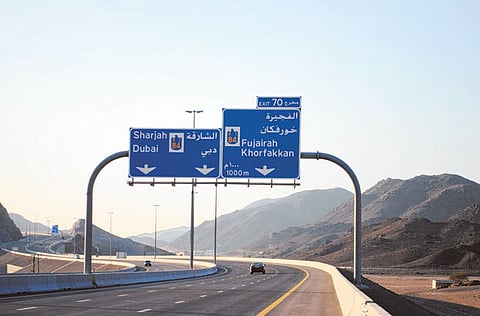UAE showcases sustainable growth model
New infrastructure projects target rapid and extensive development

Dubai: The UAE’s efforts to stake claim to some of the most developed infrastructure across the region has seen a variety of projects steadily adding to its road network while abiding by a vision of sustainable development.
As National Day approaches, Gulf News looks at the Ministry of Public Works’ role in keeping the wheels of progress moving. Over the last year, the Ministry of Public Works headed by Shaikh Hamdan Bin Mubarak Al Nahyan has helped usher in rapid and extensive development, most notably in the country’s infrastructure.
“Citizens of the UAE are now engineers, technicians and administrators. They are able to construct and achieve high-standard buildings for this country,” Shaikh Hamdan said in an earlier statement.
One of the main projects recently undertaken by the ministry was the Shaikh Khalifa Highway — also known as the Dubai-Fujairah highway — which reflects the ministry’s strategy to develop far-flung areas of the country by providing easy access.
The three-lane motorway which stretches out to 40 kilometres was built with a budget of Dh1.7 billion and has halved the journey time from Dubai to Fujairah to about one hour.
The ministry also focused its attention this year on easing the heavy burden of traffic on commuters and is currently carrying out the redevelopment project at the fifth Industrial Intersection in Sharjah on Emirates Road — commonly known as National Paints roundabout.
The roads improvement work is part of an initiative to connect the emirates for which funds were approved by President His Highness Shaikh Khalifa Bin Zayed Al Nahyan.
In August, the third and last phase of the road works project was initiated and it is expected to be completed by the end of 2013.
The ministry aims to revamp the road by widening the number of lanes to five in each direction and building new bridges to address traffic bottlenecks. In addition, a new drainage network for rain water and street lighting is also being provided.
The National Paints Roundabout area is a vital junction on Emirates Road as it links traffic to and from Dubai to Sharjah, Ajman, Umm Al Quwain, Ras Al Khaimah and Fujairah. It also leads to two major roads, the Bypass road and Emirates Road.
Achieving sustainable development is just as important to the ministry and it is actively pursuing this goal by promoting green buildings across the country.
In the middle of 2012, the ministry’s branch in the northern region announced a Dh24-million project for a school in Ras Al Khaimah that follows green architectural plans, in addition to catering to special-needs children.
The girls’ school will offer classes from the kindergarten level to Grade 5 and is the first of its kind in the UAE, as it is built according to green building specifications, with a large area that includes an extensive collection of plants.
The school has 16 classrooms and four multi-purpose areas and is being equipped with the latest technology to create a modern learning environment. It also includes three laboratories, a sports hall, a music hall, a library, art and creativity rooms, outdoor sports courts, and other facilities.
The lighting in the outdoor courts is solar-powered and the building is installed with sensors that turn off the lights if no one is in the area and turn them back on when someone walks in.
It also has an elevator and ramps to provide easy access to special needs children.
Meanwhile in Abu Dhabi, the minister of public works announced a ‘green laboratory’ project that aims to run a whole laboratory on solar energy and wind. The initiative also attempts to offer sustainable scientific devices to students and to prepare them for a curriculum highlighting the importance of sustainability.
The new project also includes an effort to cut power consumption in accordance with the government’s accent on sustainability. It was previously reported that the UAE aims to produce seven per cent of its power requirement from alternative energy sources by 2020.
The new initiative also focuses on spreading the word on sustainability and will be taken up in collaboration with the Ministry of Education. The initiative will see particular focus on waste recycling during the construction of buildings and the use of eco-friendly materials.
Sign up for the Daily Briefing
Get the latest news and updates straight to your inbox



